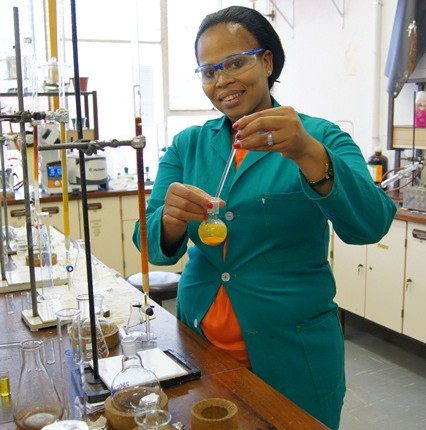Chemical liquids, mixing compounds, bubbling glass beakers, a lab mask and white coat are all part and parcel of Zikhona Tywabi’s daily life.
The DUT PhD Chemistry student has been hard at work looking at ways to curb pollution through her research-work. A “green work industry” is her aim, saying she believes industrial companies must take responsibility and become more eco-friendly in how they do business and minimise waste production.
Under the supervision of Dr Bruce Sithole from UKZN based Council of Scientific and Industrial Research (CSIR) and Prof Nirmala Deenadayalu from the Chemistry Department at DUT, Tywabi is currently doing her research project on the use of ionic liquids (green solvents) instead of traditional solvents in dissolving biomass and pulp.
Tywabi said dissolving pulp, also called dissolving cellulose, is a bleached wood pulp, a most abundant biodegradable renewable polymer.
“It has gained significant attention in the development of new “green” materials for sustainability and eco-friendly purposes. With increasing governmental regulations in the industry, the need to implement green processes in order to prevent pollution and waste production is becoming important because current technologies are mostly non-green,” she said.
Tywabi said the use of ionic liquids (IL) as a green replacement for conventional solvents will offer potential benefits over the existing dissolution methods. She stressed that ionic liquids have advantages such being easily recyclable, non-flammable and thermal stability.
“Through my project, I use green methods to try and dissolve pulp. One approach I’m looking at is radiation methods to dissolve pulp. Last year, I travelled to the University of Alabama’s Centre for Green Manufacturing where I carried out some experimental work under the guidance of Professor Robin Rogers, an internationally recognised expert in the field of ionic liquids and green chemistry. After I had collected all my data, I came back and presented my results. My results were presented at various conferences such as the Technical Association of the Pulp and Paper Industry of South Africa (TAPPSA) National Conference and Exhibition which was held in Durban last year. From this, a full paper was also developed for publication in a peer reviewed journal that was submitted in February this year after it was reviewed by my project supervisors. In addition, I presented an oral paper at the 41st South African Chemical Institute (SACI) National Convention that was held in East London in December last year. A full paper is currently being developed from this for submission to the Carbohydrate Polymer Journal in June this year. I am busy with the full thesis to be submitted by December 2014,” she said.
Tywabi believes that every person will benefit from cutting down the rate of pollution.
“The benefit of this study is that in time to come, it will help eliminate pollution. This study has provided me with new information in terms of establishing a chemical database as this has never been in done in South Africa before. However, more research still needs to be done,” she added.
Zikhona, who initially planned to study medicine, hopes to do her post-doctorate in chemistry sometime in the future. She hopes to form partnerships with other countries and pull resources together to tackle the ongoing problem of pollution and find more practical, green ways to live and work in our fast-paced world.
– Waheeda Peters
Pictured: PhD Chemistry student, Zikhona Tywabi is always looking for ways to reduce pollution through her research.


